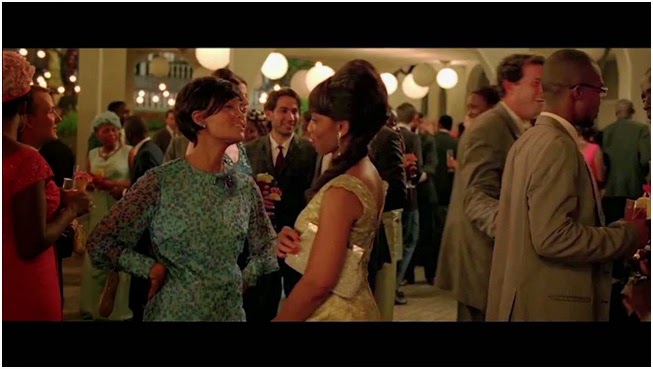Jude Zambarakji: Half of a Yellow Sun Review: A Magnificent Empty Shell (6/10) [OPINION]
Boasting the biggest budget in Nollywood history (close to 10 million dollars), Half of a Yellow Sun is an emotionally powerful and well-crafted love story set in the context of the Biafran war. It is based on Chimamanda’s novel of the same name Half of a Yellow Sun, and takes us on an emotional journey through the lives of a wealthy Nigerian family torn apart by a civil war.
This Nigerian blockbuster may be the nation’s most lavish production, but cinematographer Borman’s naturalistic lighting, director Bandele’s impeccable casting and the brilliantly subtle performances of his all-star cast could not elevate Chimamanda’s half-hearted exploration of the Biafran war beyond its lush shallow surface.
I agree with the choir of Western critics that Bandele’s adaptation dwells too much on the trivial relationships of an upper middle-class family. Some viewers, especially those who love the traditional overly melodramatic Nigerian narrative, may find Chimamanda’s sentimental approach to historical storytelling delightful, but I find the pseudo-intellectualism of a rich pampered Nigerian family painful to watch. I would have loved to see Odenigbo as a true revolutionary professor in the mould of Walter Rodney, but what I got to see was an amusing tribalist sarcastically referred to as a ‘revolutionary’ by his wife’s sister Kainene.
Sadly, one must be well versed in Nigerian history in order to make sense of Half of a Yellow Sun’s muddled historical story. Those looking for a cinematic history lesson would be better off fervently searching for the DVD of BBC’s Biafran war documentary.
So much screen time is spent on petty family bickering and sexual infidelity that no time was devoted to depicting the staggering loss of Nigerian life. Bandele’s adaptation seems so miniscule in comparison to the true genocidal-scale of the Biafran war. Bandele’s direction failed to capture the enormous size and scope of the Biafran famine. Nigeria’s most important civil war got little more than half of a moment’s thought.
Chimamanda’s recounting of the Biafran war though euphemized by Biyi’s genteel storytelling which hides much of the graphic violence of the Nigerian Federation’s genocidal policies that made her novel so memorable is still immensely boring compared to actual history. Many of the most fascinating aspects of the Biafran war are either remotely alluded (e.g. Nigeria’s attempts to prevent food aid from reaching Biafra which led to the deaths of more than half a million Biafrans), or completely absent in Chimamanda’s much hyped novel and Biyi’s earnest adaptation such as the famous Biafran Airlift and the almost comical coup practice drill: “Exercise Damisa”.

Other intriguing aspects of the Biafran war are still ripe for cinematic storytelling. Let’s take Biafra’s military strategy as an example.Outgunned and outmanned Biafra had no chance of defeating Nigeria and knowing full well that newly formed state could not militarily defeat a massive federation Colonel Ojukwu, the president of the Biafran Republic, decided to wage a propaganda war against Nigeria. Ojukwu used every form of propaganda imaginable. He even went so far as to provide military training to the Biafran children still strong and nourished enough to hold a gun. Some may find Ojukwu’s attempt to inspire his soldiers to continue fighting a hopeless war heroic, while others may find his disturbingly serene demeanour as sure-fire evidence that he was willing to sacrifice his people for political gain. Unfortunately, Bandele’s adaptation showed no concern for such political ambiguities.Alas, Half of a Yellow Sun gives us only a small glimpse into the startling political complexities of the Biafran war.
Nigeria is one of those curious countries that is flooded with superficial commercial movies, but is at the same time experiencing a prolonged drought of in-depth socio-political documentaries. No Nigerian director has ever made a documentary about the Biafran war. This is self-censorship and wilful ignorance on a grand scale. In fact, you’re more likely to find a very informative documentary made by a foreign director about African politics than an African filmmaker who has documented the political history of his own country.
Adichie’s somewhat sentimental view of her own nation’s history in Half of a Yellow Sun won’t help Nigeria heal from her troubled past and Balende’s adaptation may not stand the test of time, but it marks the beginning of a breath-taking career.
*Written by Jude Zambarakji



![EMU OFFICIAL Graduation Yearbook - 2015/16 Academic Year Fall is OUT NOW! [VIEW]](https://blogger.googleusercontent.com/img/b/R29vZ2xl/AVvXsEh94dfa6QrBx4fdCZhHqUOnqsU5stkXolQ9qOqid7E4B-uQrXXKWxnC4WU35hHl6zmAVrFsesVHPmSMIbxwNPESkKeyi-FCTGbVRgWn8D2R9Jp5-d7DRFN2ni4IieWWDkRyyzM7BodS4BaW/s72-c/BOOKBOOK.JPG)

![Jude Zambarakji: Half of a Yellow Sun Review: A Magnificent Empty Shell (6/10) [OPINION]](https://blogger.googleusercontent.com/img/b/R29vZ2xl/AVvXsEi_mwAxu8-yxuE5gJLkPT0fMEcX6xmwoegIc8xPrNXD9cMqItoBcvyk5BE8ZrXCydmtJP9m3Ir24UZDi1YBaxCihFhHkXiA8RYBN2chZU-UMsTGv41mtTnJEGefv4fGlL97A_xeNWSVU4I/s72-c/SUN.jpg)


![Poetry Is An Intimate And Powerful Way To Express Myself - Theresa Lola [VIDEO]](https://blogger.googleusercontent.com/img/b/R29vZ2xl/AVvXsEjJqFx0an7dy6Jiqy480SnYTw_DduJWWdI4Yr3MyZIZa8w3Iv45BevNiJkqWPOX24hS2pSjEW44h12qBm3nTXHXec2-p5Wh-Bzt43Lfa843VSTf7bt1t_ka2L27jewe2pbMYiqo5eAJUbM/s72-c/her.jpg)
![Dineo Nguwazi Lebata: Multiplicity Of Churches And Falsehood! [OPINION]](https://blogger.googleusercontent.com/img/b/R29vZ2xl/AVvXsEgCatezqEc-fGYva1IDe1WImj1DkaeRymNcnlNBMJvL_PdmUBv9U0D-da8F6a7iG0zwst-HzBDKk6lzlWVTt0hmEoODEkEUYnL3IxuQvYBRGXVwWhdNrBflK8XUO269C6Y_cm4Xjg9gqTI/s72-c/church2.JPG)
![Ms Doyin: This Life is a Test, It is only a Test ...NOT [OPINION]](https://blogger.googleusercontent.com/img/b/R29vZ2xl/AVvXsEiUj-YoxNMAVweiqhRH6O2l3YeqxWCyKyyAzFDKH7jmScwjRBJtjNZe_Qd88ihDd6pTZhqHU9zeVO9mOmRmzASr-jGo1xn6sPkR2MOW8riM7Tbx4vXvDP6iU-0qTtC74u6JSuM0pNiukMY/s72-c/doyin.JPG)

totally unbiased report and review. kudos. salient points made. all observed. nice blog
ReplyDeleteI'm aroused by the idea of several plots burgeoning from the Biafra war. The future is coming.
ReplyDeletehaven't even seen the movie. Is there a way one can watch it here?
ReplyDelete